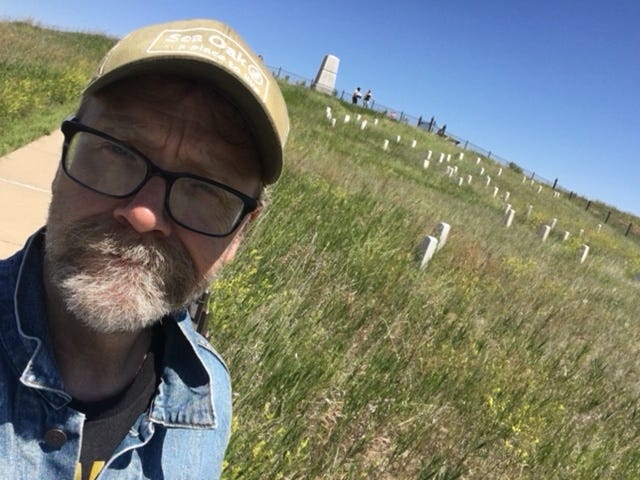The Kindness Person: A Conversation with George Saunders
On the moral imperative of writing, kindness as realism, how not to despair, and why he doesn't write about animals and other beings he likes.
Intimate conversations with our greatest heart-centered minds.
As means of an introduction, I’m tempted to write simply:
. I believe those two words alone convey the deep humanity, kindness, and humor as well as the astounding level of talent, craftsmanship, and delightfully-tender-and-fanciful imagination that he possesses. But for the person who might not be familiar with George’s work, I’ll add a bit more.George has written twelve books including Lincoln in the Bardo which won the 2017 Man Booker Prize; A Swim In A Pond In The Rain in which George takes apart gorgeous, classic Russian short stories so we can learn to write our own hopefully-gorgeous, hopefully-one-day-classic short stories; Pastorali which was the first of his books I read and by which I am forever changed; and Tenth of December which is basically perfect.
His latest book, Liberation Day, a collection of short stories which is also basically perfect, was just released in paperback. As with all his writing, George carefully ushers us into often unfamiliar terrain: there are people pinioned to a wall telling epic stories, other people living in an amusement park that never has visitors, and still others in more recognizable office spaces and home kitchens. But what is always familiar is the human longing, gentleness, despair, cruelty, compassion, fear, hope, and ultimately kindness that comprises most of us. This is what I most love about George’s work: no matter how utterly bizarre a situation may be, somewhere—sometimes dead center, sometimes tucked way-way-way in a corner, sometimes a mere drop inside a character’s cells—there is kindness.
George’s stories appear regularly in The New Yorker. He’s received both MacArthur and Guggenheim Fellowships. He teaches at Syracuse University—where Cheryl Strayed was once one of his students. And he writes the wildly popular
here on Substack.***
An important update: This interview and all newly published interviews moving forward are now 100% free for their first week. I hope you enjoy and share them! Coming up next week, I’m sharing an incredibly poignant and useful deep dive on writing advice from George, and it will be paywalled. If you haven’t upgraded your subscription yet, now is a good time!
I want to start with kindness. So much of your writing is centered around it, including how many of us struggle with it. Why is kindness important to you?
One of the first images I received of Jesus was this idea of somebody who was so aware of where he was and so selfless that he could intuit what was needed in a given situation to make it better. When I was younger, it hit me that that would be a superpower if I could do that.
Then I got drafted into doing my daughter's sixth grade graduation speech. And I thought, Well, what do I really know as an old fart? It was not much, actually. Except when I scanned back over my life, I had a couple of regrets. They almost all had to do with not being kind enough, which for me often meant being preoccupied with something else or being anxious or being too insecure to step up and do what somewhere in my body I knew was right.
I shared that with the sixth graders, and a few years later gave a version of that to the Syracuse group. At that point, I wouldn't have said that I was that interested in kindness. But you make a speech like that and it gets attention. Suddenly you're The Kindness Person.
For me, it's the practice of trying to believe that the person on the other side is just as real as you are. You happen to be seeing things through these eyes. But theoretically, you could flip around and see them through the other person's eyes, and it would be the same universe.
That has a lot of moral implications, but it also has aesthetic implications. Meaning that story is like a snow globe that you can walk around and go, “Oh, if I imagined these events from this point of view, it would look like this. If I change the perspective, it looks like that.” In the end, the holographic view of the story would be infused with total compassion because you'd know every angle and they would all seem completely reasonable.
Speaking of the snow globe: So many of your characters are trying to be and do good. And it’s really complicated. What feels like doing good in one moment can change in the next based on something as simple as the character walks into a different room. Or we move into another character’s equally convincing POV that opposes or contradicts the one we were just immersed in. Is good something concrete and definable? Is there an Ultimate Truth to life?






